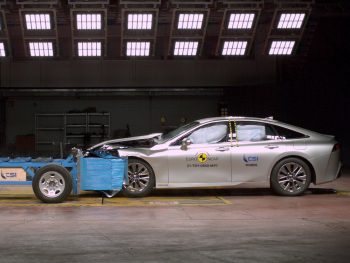EVs and hybrids score five-star results in latest Euro NCAP tests
Five cars, spanning battery electric vehicles (BEVs), hybrids and a hydrogen fuel cell vehicle, have scored full five-star safety ratings in the latest round of Euro NCAP tests.

The hydrogen-powered Toyota Mirai scored highly in the Adult (88%) and Child Occupant (85%) Protection categories
The tests were carried out on the Audi Q4 e-tron, Lynk and Co 01, Nio ES8, Subaru Outback and Toyota Mirai, with all bar the Outback using alternative propulsion methods. In addition, Ford’s Kuga PHEV variant was awarded the same 2019 five-star rating as its combustion-engined version.
The results saw the hydrogen-powered Toyota Mirai perform very well, scoring highly in the Adult (88%) and Child Occupant (85%) Protection categories.
Matthew Avery, director of research Thatcham Research and Euro NCAP board member, welcomed the results, saying: “Despite consumer concerns surrounding their potential volatility due to the high-pressure tank, the Toyota Mirai demonstrates that hydrogen fuelled vehicles can be just as secure and safe as their combustion and electric-propelled equivalents.
“The Toyota Mirai is designed for a global market, so it’s really encouraging to see that it still meets the overall standard required in Europe. There are still areas for improvement such as the fitment of a centre airbag to mitigate occupant to occupant impacts during a collision, but it’s positive to see this car scoring so well. A great result for consumer confidence in hydrogen fuelled vehicles.”
Meanwhile, the fully electric, large off-road Audi e Tron, which comes with centre airbags fitted, scored very highly in Adult Occupant Protection (93%), showing a good level of protection across all shapes and size of dummy.
Also assessed was the Lynk & Co 01, a brand-new car to Europe and the first mainstream carmaker to offer vehicles on a membership-only basis.
Sharing the same platform as the Volvo XC40, the Lynk & Co 01 is now the best-performing Chinese car to be tested by Euro NCAP, scoring 96% for Adult Occupant Protection, thanks to good protection of all critical body areas for the driver and passenger dummies. The car also features a centre airbag, contributing to its high score.
The tests also included the fully electric Nio ES8; another Chinese car that is new to Europe. On sale first in Norway, the all-electric 6/7 seater scored excellent results for its autonomous emergency braking system and a full complement of other crash-avoidance features. It gained a 92% score for Safety Assist.
“The safety performance of the Lynk & Co 01 and the Nio ES8, both produced by Chinese carmakers, is especially reassuring and shows that vehicles produced in the region can meet the higher safety standards demanded by Euro NCAP,” said Avery.
Finally, the Subaru Outback (95%) also achieved a five-star Euro NCAP rating, posting one of the highest Safety Assist scores seen in the 2021 programme, with a 95% figure.
Like the Nio, the car is equipped with a system which detects signs of fatigue or impairment directly from the driver’s eye movements and combines this with steering behaviour to issue a warning when a break is needed. The Subaru and the Nio are amongst the first production cars to feature this innovative technology, which is expected to become more mainstream in the coming years.
Euro NCAP’s secretary general, Michiel van Ratingen, said: “This round of tests highlights the direction in which car technology is moving. All but one of the cars are electrified in some way or another. The Mirai has hydrogen fuel cell technology. These are moves driven by a need for greater protection of the environment. But the cars also have some of the very latest active safety technology and this, too, is part of a trend that has been going on for some time and will continue to do so, to save lives on Europe’s roads. The manufacturers of these cars don’t ask you to choose between saving the planet or saving your family, and nor should you be asked to!”












